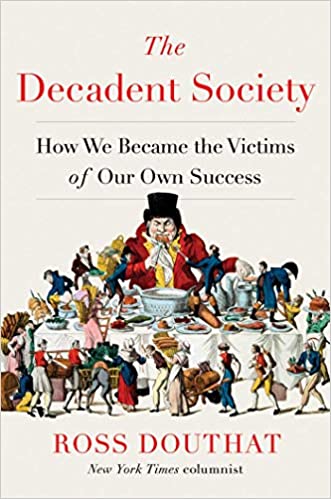You have /5 articles left.
Sign up for a free account or log in.
 The Decadent Society: How We Became the Victims of Our Own Success by Ross Douthat
The Decadent Society: How We Became the Victims of Our Own Success by Ross Douthat
Published in February 2020
What happens to a decadent society during a pandemic?
If Ross Douthat, the New York Times conservative columnist and author of The Decadent Society is right, we are all going to find out.
Douthat’s diagnosis that we are living in a decadent age -- at least before COVID-19 -- is based on his reading of a set of overlapping political, cultural, economic and demographic trends.
Decadence is not the same as unearned privilege, as personified in the work ethic (or lack thereof) of those who inherit rather than earn their wealth.
A decadent society is one characterized by political stagnation paired with extreme partisanship, resulting in popular uprisings (Brexit, Trump), but very little in the way of impactful policy initiatives.
Other signs of decadence are the cultural exhaustion of endlessly recycled superhero movies, interrupted only when the latest recycled Star Wars film lands in theaters.
Perhaps the clearest signals of societal decadence are demographic. Below-replacement fertility (women having fewer than 2.1 births over their lifetimes) will inevitably mean slower economic growth and less cultural dynamism.
Before COVID-19, I would have reviewed The Decadent Society by picking apart its arguments about stagnation. Likely, I would have pointed out that anyone arguing that things were better in the past (Douthat points to 1969 and the moon landing as a counterdecadent time) is likely looking at the wrong trends.
Sure, we got iPhones and not flying cars. Still, the last few decades have also witnessed hundreds of millions of people (mostly in East and South Asia) transitioning from subsistence poverty to a state of relative economic well-being. High childhood and maternal mortality in developing countries have been replaced with death rates closer to those of yesterday’s wealthy nations.
The U.S. may have stagnated economically since the 1970s. (In reality, the U.S. stratified more than stagnated.) Still, the U.S. and other already wealthy countries should not be the measuring stick of progress. Much better to look at the recent history of East and South Asia (and parts of Latin America and Africa), then to focus on the relatively low-population areas of Europe and North America.
My arguments against The Decadent Society, however, are made somewhat hollow by the impact of COVID-19.
One of Douthat’s claims is that a decadent society would fail to see a black swan event like a pandemic coming and would mismanage it once it arrives. Watching the Trump administration’s slow and inept handling of the pandemic makes it hard to argue with the idea that our political institutions have calcified.
On the other hand, if we do accept Douthat’s arguments that we were a decadent society before COVID-19 (I don’t), it would be difficult to argue that we are decadent now. Nowadays, nobody is feeling settled, tranquil or secure. Health-care workers put their health on the line each day to take care of the sick, demonstrating a level of courage and commitment that has no resemblance to decadence.
In the world of higher education, every one of us has been forced to rethink almost everything. The positivity and flexibility that educators and students have demonstrated in making a nearly overnight shift from residential to remote learning is a terrific demonstration of our ecosystem’s energy and creativity.
The Decadent Society was only published a couple of months ago, and yet it reads like a book from another time.
Wouldn’t it be nice to go back to worrying about the dangers of unoriginal movies and too much screen time?
The Decadent Society is a smart and tightly argued, if ultimately unconvincing, work of social criticism. It is one of those books that I enjoyed reading while also disagreeing with most of its conclusions.
The Decadent Society also demonstrates clearly that we will need a post-COVID-19 nonfiction reset.
What are you reading?




